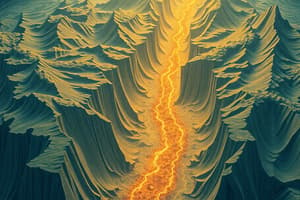Podcast
Questions and Answers
What is the primary cause of earthquakes?
What is the primary cause of earthquakes?
- The collision of meteorites with the Earth's surface
- The activities of volcanoes deep beneath the Earth's crust
- The gravitational pull of the moon on the Earth
- The movement of tectonic plates along fault lines (correct)
What is a seismograph used for?
What is a seismograph used for?
- Monitoring the movement of tectonic plates
- Recording volcanic eruptions
- Studying the impact of meteorite collisions
- Measuring the strength and details of earthquakes (correct)
What are foreshocks in relation to earthquakes?
What are foreshocks in relation to earthquakes?
- Smaller quakes that occur prior to the mainshock (correct)
- The seismic waves that cause the most damage
- The initial tremors felt before an earthquake
- The aftershocks following a major earthquake
Why are geologists unable to predict when earthquakes will occur?
Why are geologists unable to predict when earthquakes will occur?
What happens when tension builds up between tectonic plates without any movement?
What happens when tension builds up between tectonic plates without any movement?
What is the primary purpose of a seismograph?
What is the primary purpose of a seismograph?
Why are foreshocks less likely to do damage than aftershocks?
Why are foreshocks less likely to do damage than aftershocks?
What causes aftershocks to occur many days or years after a main quake?
What causes aftershocks to occur many days or years after a main quake?
Why are aftershocks sometimes just as hazardous as the main quake itself?
Why are aftershocks sometimes just as hazardous as the main quake itself?
How are foreshocks and aftershocks related to earthquakes?
How are foreshocks and aftershocks related to earthquakes?
What defines a quake as a foreshock?
What defines a quake as a foreshock?
How are aftershocks different from foreshocks?
How are aftershocks different from foreshocks?
Why can't earthquakes be predicted using foreshocks?
Why can't earthquakes be predicted using foreshocks?
What causes aftershocks to occur?
What causes aftershocks to occur?
How long can aftershocks last?
How long can aftershocks last?
Flashcards are hidden until you start studying




